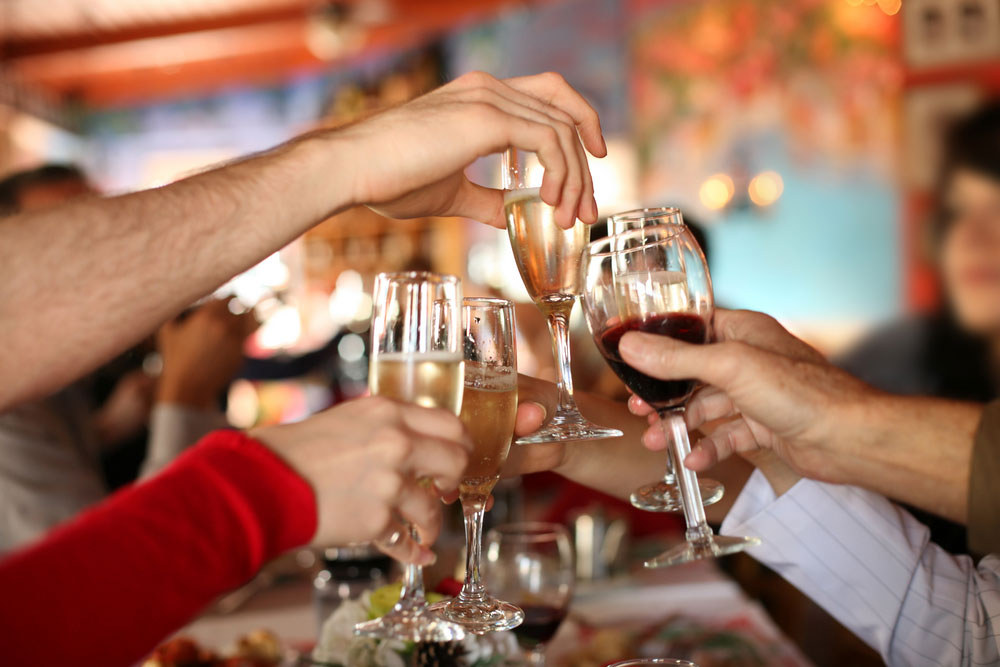4 Reasons to Limit Super Bowl Toasts

Like millions of football fans, lovers of Beyoncé and advertising junkies, you'll probably be attending or hosting a Super Bowl party on Sunday. Think chips and dip. Nachos. Ribs. Chili. And, last but not least, wine and beer — and plenty of it. As you drink and nosh and drink, keep in mind: Come Monday morning, you may be paying the price for overdoing it in the alcohol department. That's why it's important to pace yourself. If you drink at all, experts, including the Centers for Disease Control and Prevention, recommend drinking in moderation. That means no more than one drink a day for women and no more than two for men — though that doesn't mean you should drink every day. Heavy drinking is defined as having five or more drinks on one occasion if you're a man and four or more if you're a woman. Here, four reasons why you need to keep tabs on the amount of alcohol you drink during the game.
Impaired Driving. Blood-alcohol concentration (BAC) levels can reach 0.08 percent or higher when a man has five or more drinks and a woman has four or more drinks within two hours, according to the National Institute on Alcohol Abuse and Alcoholism. Anyone who gets behind the wheel of a car with a BAC of 0.08 percent or higher is said to be driving while impaired. According to Mothers Against Drunk Driving (MADD), on Super Bowl Sunday 2011 43 percent of all traffic fatalities involved a drunk driver. By contrast, 31 percent of total traffic fatalities for the year did so. If you or a guest does overdo it, make sure a designated driver is available.
Poor Sleep. Drink too much at the Super Bowl party and you likely won't be bright-eyed and bushy-tailed come Monday morning. Research to be published in the April issue of the journal Alcoholism: Clinical and Experimental Research has found that regardless of how much people imbibe, alcohol reduces the amount of time it takes to fall asleep. It also increases deep sleep during the first part of the night. But during the second half of the night, people wake up. Also, moderate drinking (two to four drinks) and heavier drinking (more than four drinks) reduces rapid-eye movement (REM) sleep during the night. That's the stage of sleep when dreams occur and is thought to be important for memory.
Extra Calories. If you’re watching your waistline — and who isn't? — the hard truth is that alcohol will increase caloric intake, leading to weight gain. Men ages 20 to 39 get about 175 calories a day from alcohol and women in this age group get about 60 calories a day from booze. Nearly 20 percent of men and six percent of women get more than 300 calories a day from alcohol alone, according to recent findings from the National Center for Health Statistics. That's only part of the caloric downside. According to research published in the journal Appetite, people who drink alcohol with a meal also eat more.
Trouble Learning. Men who down five or more drinks at a time and women who quaff four or more on one occasion — so-called binge drinking — may nurse more than a hangover. Spanish researchers have reported that excess amounts of alcohol may actually damage the hippocampus, the part of the brain responsible for learning and memory.
The researchers, from the University of Santiago of Compostela, gave college students — half engaged in binge drinking and half did not — three tests. The first involved learning and recalling 15 words. For the second test, the students were told a story and then asked about it 30 minutes later. These two tests measured verbal memory. During the third test, which assessed visual memory, students had to remember information from four images they were shown. The students who reported binge drinking scored worse than their non-binge-drinking peers on the two tests that measured verbal memory, showing a "clear association between binge drinking and a lower ability to learn new verbal information in healthy college students," said study researcher Maria Parada in a statement. The study was published in the journal Alcoholism: Clinical and Experimental Research in August 2011.
Pass It On: Super Bowl drinking may affect weight, sleep, memory and driving.
Sign up for the Live Science daily newsletter now
Get the world’s most fascinating discoveries delivered straight to your inbox.
This story was provided by MyHealthNewsDaily, a sister site to LiveScience. Follow MyHealthNewsDaily on Twitter @MyHealth_MHND. We're also on Facebook & Google+.









